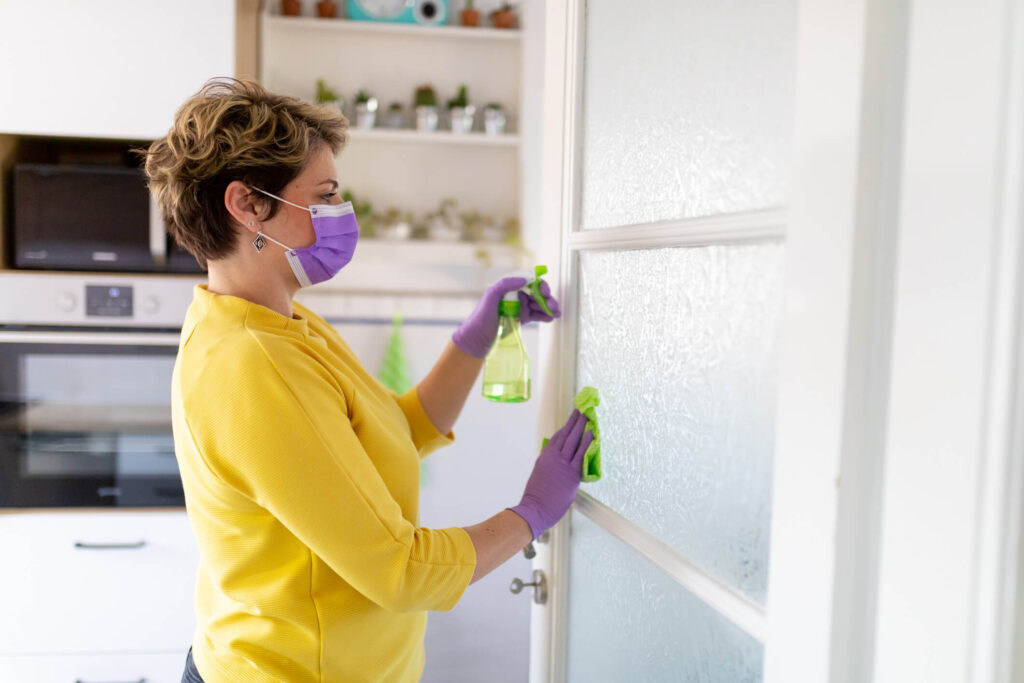Planning the transition to long-term care for a parent is stressful even under ordinary circumstances. During a public health care crisis, the decision can be mindboggling.
Like many, protecting your loved ones against coronavirus infection is your number one priority. Health care experts recommend carefully weighing the pros and cons of all options before making your move.
In-Home Care or Senior Living During Covid
According to the World Health Organization, Covid-19 is primarily transmitted between people through respiratory droplets. Whether you are caring for someone at home or planning a move to an assisted living community, a higher level of hygiene management will be necessary to maintain the safety and well-being of your loved one.
- If you are planning to care for someone who needs help with personal care activities such as bathing or eating, plan on taking extra precautions at home to protect your loved one.
- If you are considering a move to a residential care facility, ask for specific information about infection prevention protocols.
- If you are considering moving a loved one home from assisted living, determine if the move is worth the added stress and risk.
Safety in Senior Living
If you work outside the home and are suddenly faced with the need to provide care for a parent or spouse, the risk of exposure to Covid-19 can be worrisome. Assisted living communities offer a safety net to older adults during the coronavirus pandemic.
Infection prevention policies at assisted living communities range from enhanced sanitation protocols and symptom screenings to restricted visitation and routine testing, among other precautions.
Reproducing and enforcing a similar level of infection control in one’s home is difficult even in the best of times. During the coronavirus pandemic, the need to disinfect all frequently touched surfaces and shared common spaces and rooms in the home may not be practical.
People living with Alzheimer’s disease and dementia in particular need help remembering important hygienic practices such as washing hands.
Under the guidance of the Centers for Disease Control and local government directives, assisted living and memory care communities ensure frequent and rigorous cleaning of high-touch surfaces while ensuring adequate levels of personal protective equipment (PPE) are on hand.

Personal Care and Support 24/7
If your loved one currently resides in an assisted living or memory care community, moving them out during coronavirus may place your loved one at greater risk of exposure and add stress. Moving is disruptive to older adults and is not guaranteed protection for preventing Covid-19 disease.
In addition to strict hygiene and safety protocols, assisted living facilities provide personal care assistance with bathing, grooming, dressing and dining. For many families, the 24-hour care and supervision by professionally trained caregivers cannot be provided at home.
If you cannot provide adequate time, care and infection controls in the home, your loved one will most likely be safer staying in or moving to a residential care facility.
Safe Social Distancing
Safety in the home should weigh heavily into your decision. For many, the family home is simply not large enough to practice safe social distancing.
Safe distancing from an older adult or grandparent may not be practical in larger families with children and extended family. Asymptomatic teens who have a tendency to come and go may unintentionally place an older family member at greater risk of infection.
Given the high rate of transmission of Covid within the home setting, family members who work out of the home may expose their loved one to coronavirus.
Testing
Along with strict infection prevention protocols, some assisted living communities, including Sonata Senior Living, are proactively testing both residents and staff to isolate early infections and eliminate the risk of transmission.
Older adults sheltering in place at home may not have the same access to testing and care as residents who reside in assisted living.
Social Isolation
Social isolation takes a toll on the emotional and physical health of older adults. According to Pew Research Center, in the United States, 27% of adults ages 60 and older live alone.
The likelihood of living alone also increases with age. Among women age 75+, nearly half live alone, placing them at greater risk of the health consequences of social withdrawal and isolation.
While video chatting and virtual events help bridge connections with those living alone, many older adults do not have the resources or means to engage in video technologies.
Health care professionals agree that loneliness is a health concern among older adults, particularly those that live alone. Assisted living facilities remain a safe and viable way to combat the isolation and loneliness that result from sheltering in place during the coronavirus pandemic.
In senior living communities, professional lifestyle directors offer a safer form of socialization with attentive oversight and management of social distancing best practices. From room-service style meal delivery services to programs-on-wheels, professional caregivers keep residents active and cheerfully engaged.
Planning A Move
Assisted living and residential care facilities remain the best choice for many older adults, particularly those living with a chronic illness who require assistance with daily activities. Seniors with Alzheimer’s disease and dementia symptoms and behaviors are especially vulnerable due to the cognitive impairment that make self-care and personal hygiene more challenging.
It is natural to worry about your loved ones’ safety during the coronavirus pandemic. Moving a loved one to a residential care facility may be the best way to keep your loved one safe during coronavirus.
Keeping residents safe and happy is the number one priority of Sonata Senior Living. To learn more about Sonata’s Covid-19 precautionary measures, contact us today.
